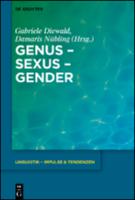Genus – Sexus – Gender
| dc.contributor.editor | Diewald, Gabriele | |
| dc.contributor.editor | Nübling, Damaris | |
| dc.date.accessioned | 2022-07-06T14:26:50Z | |
| dc.date.available | 2022-07-06T14:26:50Z | |
| dc.date.issued | 2022 | |
| dc.identifier | ONIX_20220706_9783110746396_34 | |
| dc.identifier | OCN: 1313540039 | |
| dc.identifier.issn | 1612-8702 | |
| dc.identifier.uri | https://library.oapen.org/handle/20.500.12657/57241 | |
| dc.language | German | |
| dc.relation.ispartofseries | Linguistik – Impulse & Tendenzen | |
| dc.subject.other | Gender Linguistics | |
| dc.subject.other | Gender-neutral Language | |
| dc.subject.other | Feminist Language Criticism | |
| dc.subject.other | Factors of Language Change | |
| dc.title | Genus – Sexus – Gender | |
| dc.type | book | |
| oapen.abstract.otherlanguage | This volume brings together the latest empirical research on the connections between grammatical gender, natural gender, and the social category of gender. This trio operates on various levels: lexically and semantically, morphologically, syntactically, pragmatically, and in texts and discourse. These categories prove to be deeply entrenched within the German lexis and grammar. They reflect old orders of gender but also how they have transformed. | |
| oapen.identifier.doi | 10.1515/9783110746396 | |
| oapen.relation.isPublishedBy | 2b386f62-fc18-4108-bcf1-ade3ed4cf2f3 | |
| oapen.relation.isbn | 9783110746396 | |
| oapen.relation.isbn | 9783110746259 | |
| oapen.relation.isbn | 9783110746525 | |
| oapen.imprint | De Gruyter | |
| oapen.series.number | 95 | |
| oapen.pages | 382 | |
| oapen.place.publication | Berlin/Boston |

